
I thought it would be a good idea to create a Q&A style blog for students and NQTS. I feel that this is especially important at this time, due to the uncertainty we all currently face. I asked students/NQTs to send me questions via Twitter about teaching, or any advice they sought, as they begin the first steps of their journey. I did get a number of queries, so the Q&A will be in two parts. I will answer the first four questions below:
How do I best prepare for the year ahead under the current circumstances?
Great question! We are all currently facing unprecedented times (as the media keeps telling us!) My advice, for this question, comes in three parts:
First, I would suggest that – if you are a student – you continue to take on board your professional association’s advice. If you are at a university, you should be receiving updates and online learning opportunities to help you through. As you explore the content, make sure you reflect on your own placement experiences and always think about how they theory can be applied to practice. Also, start to look into classroom routines and expectations. Pupils love consistency and routine. It is human nature to want to know what to expect – children are not different. Think about ways that you want to create a safe and purposeful environment. I would recommend Bill Roger’s ‘Classroom Behaviour: A Practical Guide to Effective Teaching, Behaviour Management and Colleague Support.’
If you have just finished your student year, I would recommend that you take this time to reflect on both your strengths and areas for development. Read around the areas that you have been advised to improve. If classroom presence was a development opportunity, find reading to support you. I would recommend Paul Dix’s ‘When the Adult Changes Everything Changes.’ This is a fantastic tool for teachers across the UK. It really got me thinking about how I approach situations with pupils as an adult, and how I could adapt my behaviour for a more positive outcome. Sue Cowley also has a selection of fantastic books to support new teachers including; ‘The Ultimate Guide to Differentiation’ and, ‘How to Survive your First Year in Teaching’. I’ve also found reading around teaching has helped me in my own practice, as I consider how I would apply certain strategies in my own context.
Secondly, don’t worry too much about creating loads of resources for your classes. You haven’t met them yet! I spent the summer before my NQT year making up loads of resources that I did not use. It wasn’t until I got to know my pupils that I could make a unit that I knew would suit their needs. As soon as you find out about the school you will be taking up your NQT year in, contact them. They should have a rough idea of the classes (or class) you will be taking forward and be able to tell you some information about them. You can also find out from the school if they have resources that you can adapt. It can be tempting as an NQT to make everything from scratch, however if there is work out there for you to look at (and even use as a model) do it. Don’t burn yourself out before you have even met the class (or classes) you will be teaching. However, it is also worthwhile remembering that schools will be under a lot of pressure right now; give them some time to get back to you with any information they have.
Thirdly, use this time to think about teaching strategies you want to learn more about. Twitter can be a great place, however there will be some who will write off (for example) group-work because it hasn’t worked for them. Don’t be put off by this. Take the time to read around your subject (or in primary, your year group). There are loads of ‘100 ideas for’ books for both primary and secondary teachers. A quick Google search will bring up a selection designed to support classroom teachers across the UK. For example Stephen Lockyer’s ‘100 ideas for Primary Teachers’ is a great tool with a variety of ideas to support teaching. I would also recommend looking at Dylan Wiliam’s work around formative assessment and feedback. Here is an example of his work at a conference (with a focus on questioning): https://www.youtube.com/watch?v=y8bHMd3PosM. Also another really important piece of advice I can give is, have a critical eye with everything. There will be pedagogy that people agree on, there will be pedagogy that people don’t. Remember you are still learning, so always think about your learners and how you can best support them with your teaching.
I am not a loud or outgoing person. Does this mean I won’t be a good teacher?
A common myth in teaching is that you need be high-spirited and an extrovert to teach. You absolutely do not. Some of the best teachers I know have a quiet and calm presence in the classroom. The pupils feel safe because they know that the person teaching them is a predictable and consistent individual. We all have our own ways to make our lessons come alive and -trust me- that does not need to be with (hopefully figurative) fireworks and explosions. Do you need to have presence? Absolutely. But that is not the same as being ‘outgoing’. Presence is not about yelling, but a large part of it is about confidence. You will have heard the ‘fake it until you make it’ mantra numerous times and, in part, it is true. Take the time to develop your own teacher identity, and think about what kind of teacher you want to be.
If you have a quiet, soft spoken voice I would think about tools you could use to get the attention of the whole class after a, for example, group-work task. There are countdown timers online which are great, and you might also want to consider a bell of some kind. This means you don’t have to strain your voice and, if it is used consistently, pupils will soon learn that is your signal for attention.
I would not consider myself an extrovert, as I enjoy time alone to recharge, however I do enjoy being in the classroom and feel like I can be myself around the pupils – to the point of eccentricity! You never know, you might feel the same when you step in front of your own class for the first time. However, also remember confidence can take time. Try different strategies out and see what works with your teaching style.
How do I successfully build relationships with pupils?
A very important question! I believe building relationships is at the core of everything we do. Children are looking for a human connection with you, and you should look for the same with them. One of the most important elements of this is building trust. To build trust you need to be as fair as possible in every situation. The reason I say ‘as fair as possible’ is because you will make mistakes – we all do. However, it is how you amend the mistake that is important. Make sure you apologise to pupils when you are wrong. Some may see this as ‘losing face’ or authority, but it actually allows the pupil to see you as a human being who makes mistakes. It is an opportunity to model to them what is important and how we should go about it.
In addition, think about how you can reframe potentially negative situations. If a pupil does something they are not supposed to do ( for example, deliberately drops their jotter on the floor and leaves it) reframe at first to: ‘Oh, I see you have dropped your jotter, let me get that for you.’ You will see the look of shock on their face as they expected an explosion of rage, but – instead – got a kind and positive response. Of course, we need to have consistency and expectations, however think of this as seeing the best in them (at first) rather than presuming they are doing something wrong.
Also, get to know pupils’ names as soon as you can. Greeting them at the door and saying their name within the first couple of days of meeting them is key. Just think about how great you feel when someone you hardly know remembers your name and uses it. Make greeting pupils at the door your opportunity to use their name and catch up. As they are entering ask them how, for example, the football game was on Saturday. This gives you a chance to build a connection before the lesson begins and can help set a positive tone. If you take the time to build relationships, you will notice a huge difference in terms of how pupils respond to you and how much more you enjoy teaching. I would recommend watching this fantastic TED Talk, ‘Every Child Needs a Champion’: https://www.youtube.com/watch?v=SFnMTHhKdkw
As well as setting a positive tone, it is also important to listen to understand rather than to respond. Most of us enjoy the sound of our voice – let’s be honest. But it is really important with pupils to ensure that we are not trying to ‘win a battle’ with them. Taking the time to really listen, can be the difference between a situation escalating or de-escalating. Tell them you understand, ask questions, and don’t interrupt when they are explaining something to you – you might find out some crucial information.
I will touch on some more points in my next response, but I feel like this is an important time to bring up safeguarding. As pupils begin to trust you, they may start to tell you information that is worrying. It is essential that you pass this information immediately to the child protection co-ordinator in your school. You will find out more about this from your school and your school’s authority.
What was your Biggest Challenge as an NQT?
This question links in really well with the question before. One of my targets as a student was to have more presence in the classroom. My lesson content was good, but I did find it challenging to ensure the whole class were listening when I was speaking to them. This meant when I started my NQT year I took a very ‘assertive discipline’ approach to my teaching. I had high expectations for pupils and I quickly established boundaries. Although this worked well to an extent, I felt something was missing. I didn’t have a connection with any of my classes. One class in particular would enter and most would give me the dirtiest look as they passed me. At the time, I had no idea what I was doing wrong. I was enjoying what I was doing, but the persona I was portraying was stopping me from building relationships with the pupils.
August and September were a blur for me. I wasn’t seeing the pupils as individuals, but was instead treating them as a class – a ‘unit’. This did do work, as I was warm and approachable whilst having my boundaries in place. However, there was always a pupil who would not respond well. When they misbehaved I would go through the procedures, but it often ended up with the pupil being sent out of the class. For me, personally, I viewed this as a failure on my part. I felt I wasn’t doing everything I could to help that child. I felt like I was missing something. After observing some teachers and doing some reading, I realised what I was missing was the most important part: a relationship with the pupil.
In a way, I knew a lot about the individual in question. I knew they had a chaotic home life and would often walk out of a class or be sent out. However, what I didn’t know was anything about them as a human. I hadn’t taken the time to get to know their likes, dislikes, or even to have a conversation with them at the start of class. I quickly learned that this was where I was going wrong.
Little things started to make a difference. Rather than being on the defence as soon as they entered the class, I would smile and ask them about something they had told me the day before – even if it was just checking up on their science experiment. I would take notice of the ‘little things’ that for most pupils wouldn’t be a big deal, but for them, to notice the little positives, made a huge difference. I soon realised that this pupil, who I thought hated school and me, was more at home in school than anywhere else.
By changing my own actions, my relationship with this pupil changed for the better. Having them in class was a pleasure and I soon realised they had a great sense of humour and enjoyed certain aspects of the course. Was it always perfect? Of course not. But taking the time to build relationships with pupils who have been constantly let down by the system, is so important.
To summarise, for me the biggest challenge, and most important lesson, was taking the time to get to know the pupils. Of course boundaries and consistency are important, but seeing children as human is even more so. We don’t all have the same home-life, and children are impacted by daily obstacles – just like adults. School is often the place where they feel the most safe and have the most trust. Building relationships not only made me a better teacher, but it also made me enjoy the profession even more.








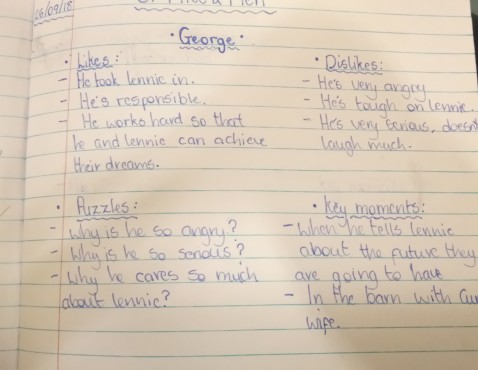
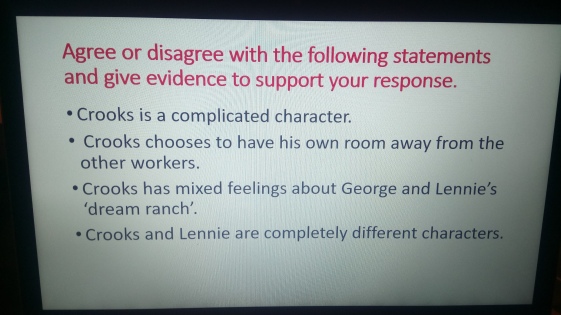
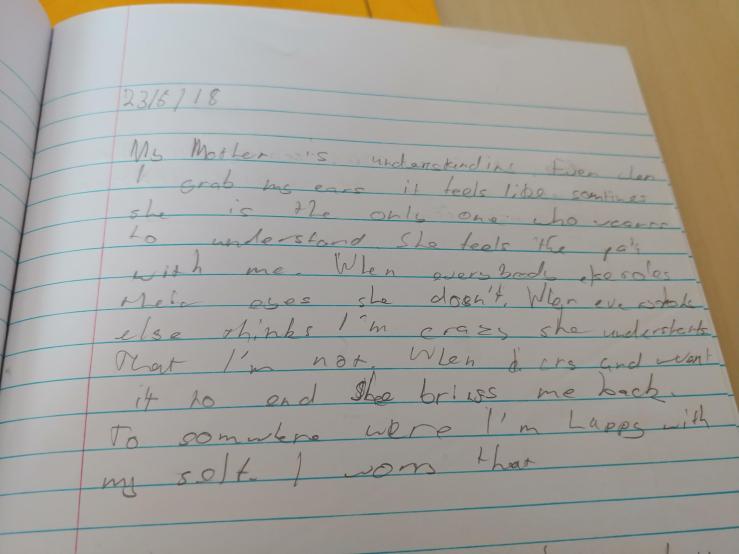

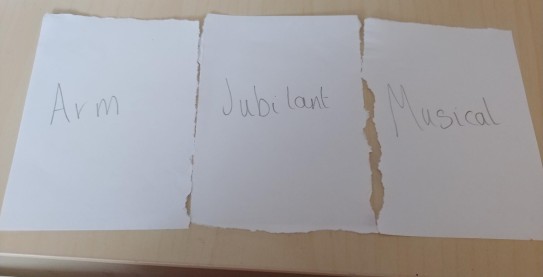





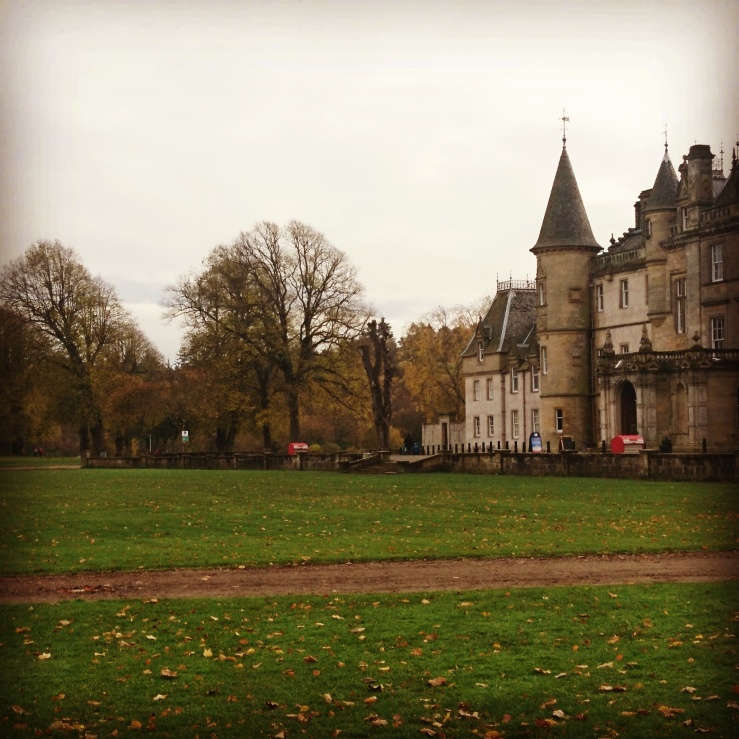

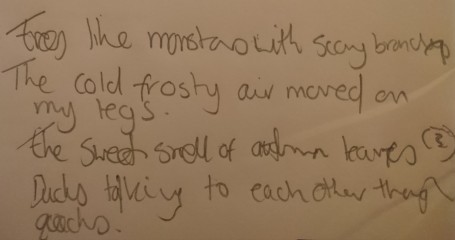
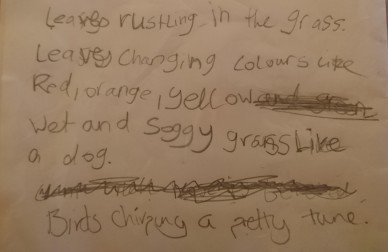 Leaves rustling in the grass, Leaves changing colours like, Red, orange and yellow. Wet and soggy grass like a dog, Birds chirping a pretty tune.
Leaves rustling in the grass, Leaves changing colours like, Red, orange and yellow. Wet and soggy grass like a dog, Birds chirping a pretty tune. The leaves are multi-coloured and falling slowly, The birds sound like a chatter. I feel the cold on my hand, As the winter air creeps in.
The leaves are multi-coloured and falling slowly, The birds sound like a chatter. I feel the cold on my hand, As the winter air creeps in.